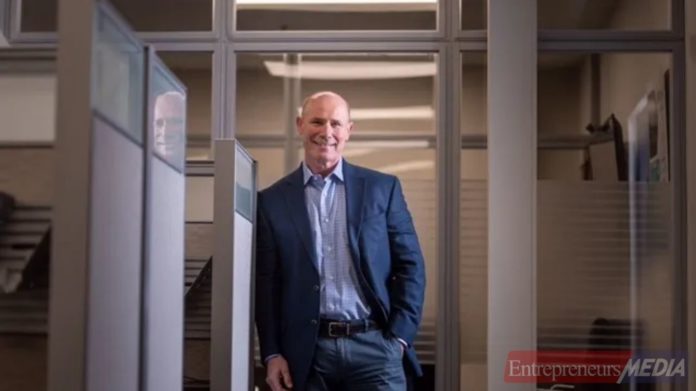Entrepreneurship is a difficult path that might lead to some dark spots. After a period of initial success, many entrepreneurs get trapped and perplexed, questioning. Who they are, where their firm is heading, and when they will be there. Some people have constructed self-imposed barriers. To assist them to deal with the grind of starting a business. Climbing over the walls is impossible, and burrowing beneath them is impossible. The only choice is to demolish them.

Mike Malatesta is a successful entrepreneur who experienced the "valley of uncertainty". While running his first firm, Advanced Waste Services, Inc. Which he sold in 2015 after expanding it for more than two decades. Malatesta, is now a strategic adviser with ERC Midwest, LLC. An industrial cleaning firm authored a book called Owner Shift. About the wake-up call he experienced in the valley.
Malatesta uncovered four entrepreneurship beliefs that he hadn’t questioned before. Although they were destructive, during his stay in the valley. You may avoid the valley of doubt by examining these assumptions today. At the very least, you’ll be less miserable on your way out.
I am capable of handling any situation.

Malatesta, like many entrepreneurs, though he could manage anything that came his way. He said this phrase over and over. He believed that given enough time, he could solve any problem on his own. He’d always prided himself on being able to handle his job, so asking for help seemed like cheating.
Malatesta remarked, “I discovered while I was in the valley. That I hadn’t set any restrictions on what my work looked like.” “I took whatever came my way, and that’s how I ended myself here.”
His lack of constraints stemmed from his belief. That he could complete any activity and solve any difficulty. That’s why he never sought help. When he was struggling, he tightened his grip even more.
But then there were the issues he couldn’t solve, and where did it take him? Straight into the abyss of indecision. Malatesta was obliged to replace his belief that “I can manage everything” with a new belief that “I can handle anything by asking for help.”
I’m in charge of everything.
Malatesta’s second deceptive idea was that he was to blame for everything that was occurring to him. It didn’t matter if it was good, awful, or indifferent. Malatesta was to blame for everything.
“It was an impossible task,” Malatesta said. “It was erroneous thinking that made me unhappy. I tried to come up with coping techniques and considered giving up.”
The realization of the fallacy in this reasoning was Malatesta’s breakthrough with this notion. He’d fully misunderstood the difference between being accountable and having the responsibility.
This notion has shifted to the idea that he can only be accountable for himself. He was responsible for everything that happened in his company and had to figure out how to deal with it properly. By rephrasing the sentence, he was able to go ahead.
- Mega Success of WOLF DEN INVESTORS SUMMIT 2024 Fuels Vision of Viksit Bharat 2047
- TiE Delhi-NCR’s D2C Summit puts a spotlight on Startups of Naya Bharat
- National Public Speaking Championship & MSME Business Awards 2024
- The Wolf Den Investors Summit is back with its second edition.
- IIEA Awardee: Meet Vivek Chauhan, Best Pastry Chef of the Year 2024
All you need is passion.
“Do something you love and you’ll never work a day in your life,” says the ancient adage. So many entrepreneurs seek their passion, believing that once they find it, their business would provide them with endless energy and make their lives worthwhile. After all, wouldn’t you do something you love for free?
That, according to Malatesta, may work. It might also hold you back if you don’t know what you’re enthusiastic about or can’t decide. As a result, when we find ourselves in a valley of doubt, we begin to doubt the concept of “follow your passion.”
“I know a lot of entrepreneurs, and none of them are genuinely enthusiastic about anything they do,” Malatesta remarked. “Not a single one,” says the narrator. This is especially true when things are still in the early stages.”
Here’s why: entrepreneurship frequently entails performing the grunt labor for a while. Malatesta used to have to remove tens of thousands of gallons of sludge out of car wash tanks. He wasn’t enthralled by it, but he wasn’t immune to it either. It was only a task he undertook to generate bills and boost the likelihood of his young company’s survival.
“You do the things that are required to survive while they are within reach,” Malatesta remarked. “Passion will presumably arrive, but it may be an unintended consequence of your path.” You may choose to love what you do if you aren’t doing what you love.
It is preferable to be alone.
The virtue of solitude was the fourth notion Malatesta had to address. He’d developed invisible barriers throughout the years of operating enterprises by locking off individuals who weren’t like him, refusing to ask for help, and feeling he had to handle problems on his own. These huge, powerful walls, he imagined, would guarantee protection and security. He felt that by keeping his troubles and flaws hidden from others, he would look stronger.
Malatesta stated, “I had established this space where I felt comfortable, but it was also a place where I felt afraid.” “I realized I was terrified to leave the grounds and live outside of my four walls.”
You may believe that your walls will keep you secure, but they have the unintended consequence of blocking your perspective of the future as well as your ability to interact with others. A future, on the other hand, is not something you can achieve on your own. Malatesta had to summon the guts to shatter his barriers and expose himself in a way that made him feel incredibly exposed.
He explained, “I discovered the solutions weren’t inside my walls.” “I had to swallow my pride and get out there if I wanted them.” I was terrified, yet my will to succeed exceeded my anxiety.” Malatesta’s life and business transformed when he started inviting people in instead of keeping them out.
Make a map for yourself

The vision that entrepreneurs began with is getting hazy for those who are encountering difficulties. Others consider them to be prosperous. Everyone continues complimenting them on whatever they’re doing, but they know the truth deep within. They’re aware that they’re in an unfamiliar environment, and they’re dealing with a lot of uncertainty.
“I’ve had a lot of huge ideas but no plan for putting them into action. Malatesta stated, “I’ve seemed successful while I’ve felt like a failure.” “I’m always doubting if I have the necessary energy, knowledge, pedigree, and resilience.” But I’m not alone.”
He eventually concluded that he owed it to himself, his clients, and his team to figure out how to get out of the valley. He needed to search inside himself to figure out what was holding him back, then construct a map that would allow him to walk his way out of the darkness and into a future he’d make for himself.
Rather than hiding behind false ideas, Malatesta sought assistance in dealing with problems, defined his responsibilities, let go of the desire to be enthusiastic in every work situation, and enlisted the aid of others in his quest. How will you get out of your abyss of insecurity?


